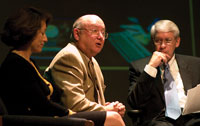Writers talk of change
| 
Joseph Vasquez /
The Collegian
The “future of
news” was on the minds of (from left) Susan Goldberg and Jim
Houck on Friday. The two newspaper editors were part of a panel
of four journalists who discussed how new technology has cut into
newspapers’ market. Under the moderation of Fresno State professor
Jim Tucker the group discussed where journalism is headed. |
By Donna Taketa
The Collegian
If you habitually read the paper,
then you are one of a dying breed, a speaker said Friday at Fresno State.
“The business models of the newspaper are right now under siege,
and I don’t think there’s any way to get around that,”
said Susan Goldberg, executive editor of the San Jose Mercury News.
“It’s not an easy job to figure out, especially (to appeal)
to the younger readers who really don’t have an interest in ink
on dead trees.”
These views were shared by keynote speaker Gary Pruitt, who is chairman,
president and CEO of the McClatchy Company, and journalism panelists at
Friday’s Roger Tatarian Journalism Symposium entitled “The
Future of News.”
The future of the news was alternatively painted bleakly and optimistically.
Panelists in the opening segment adopted a more critical stance, citing
falling readership, the lack of diversity in the newsroom and competition
from blogs and online services as contributing to the print media’s
decline.
Pruitt seemed to embrace the changing landscape and stressed the importance
of adapting to the times. Unlike most publications, the McClatchy Company
has experienced increased circulation over the past decade.
“How can we be widely successful, but dying? What is the answer
to that paradox?” Pruitt asked.
Pruitt cited diversification and focusing on immediate, not nationwide,
outlets as key.
“Technology can propel the media…and also preserve the printing
press as we know it in a sense,” Pruitt said. “People prefer
the newspaper for its obvious advantages, not all people, but the people
who do like it because of the habit of it, the portability of it, the
flexibility, serendipity of it.”
Earlier the four panelists addressed the increasing rivalry newspapers
face with the online media, and how they have to adapt to remain viable.
Online media can condense content and cater to a more specialized audience.
“The blogging phenomenon is the biggest threat to traditional media,”
said editor and writer Tim Porter, one of the panelists. He said it diverts
attention and “uses up people’s limited media time.”
Other panelists included Jim Houck, editor of the Visalia Times-Delta
and journalist Jeff Rowe.
All the panelists agreed a decline in readership persists, particularly
among the younger generation.
“It used to be you wouldn’t find an educated person that didn’t
read the paper,” Goldberg said. “Now you meet people all the
time. These are smart people too. I wouldn’t pin it just on young
people.”
The panel members seemed to agree that diversifying the gender, ethnicity
and ideology of the newsroom would also promote credibility and objectivity.
“Reporters should be neutral observers. If we’re not, I wonder
how credible we would be,” Rowe said.
In a departure from last year’s symposium, most of the panel acknowledged
that many journalists are liberal. Last year’s keynote speaker,
Helen Thomas, flatly dismissed such a notion.
“I honestly wish we had more conservative, anti-abortion gun owners
in our newsroom… not that they’d take the gun to work,”
said Goldberg of her desire for a more diverse mix of reporters.
Porter agreed over-representing one ideology, ethnicity, or educational
background could create a disconnect with the public. He said he didn’t
think personal ideology necessarily reflects in current reporting.
The panel also touched on the use of anonymous sources and embracing change
in the news format. They agreed newspapers should not all look the same
in terms of national news content, but should reflect the regions they
serve.
About 200 students attended the event, said journalism professor Tommy
Miller, symposium coordinator and Roger Tatarian chair.
The presentations did raise concern among some journalism students planning
on entering the field.
“I wonder about the direction journalism is taking us,” said
Brandon Santiago, a broadcast journalism major.
Katie Hicks, a print journalism senior, enjoyed the symposium and said
Pruitt was more upbeat than she expected.
“I am a little concerned about finding a job in journalism after
hearing a lot of the negative sides to it,” Hicks said. “It’s
moving so much into technology, and isn’t really where I wanted
to go. It makes it kind of difficult.”
In reply to a student’s question about the incentives to go into
journalism since it seems a volatile career, Pruitt said “pursue
what you really like to do. If you hear a calling, then you should pursue
it. It’s not as if the opportunities are shrinking; the opportunities
are growing.”
Comment
on this story in the News forum >>
|
